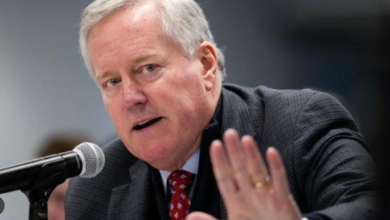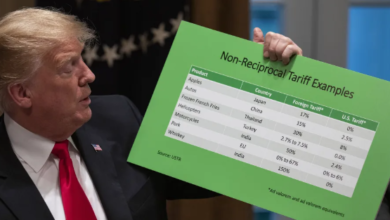Rep. Kevin McCarthy May Face Big Problems If GOP Wins Narrow Majority In House

WASHINGTON — A faction of far-right Republicans have all but promised they’ll threaten a government shutdown if the GOP wins back the House of Representatives in the upcoming election, putting leader Kevin McCarthy (R-Calif.) in a precarious position.
Members of the Freedom Caucus have said they’ll oppose any government funding bill that expires before the next Congress, when Republicans could control the chamber and have more leverage to make demands.
“We should not fund a government that is continuing to allow open borders to endanger the American people,” Rep. Chip Roy (R-Texas) said Wednesday on the House floor alongside Freedom Caucus chair Scott Perry (R-Pa.).
It’s an illustration of the challenges that will confront McCarthy, the current House minority leader, if his party prevails in November’s midterms — especially if it wins by a small margin, which seems increasingly possible.
Earlier this year, polling suggested that Republicans would retake the House in a “red wave,” giving them gigantic majorities. But the polls have shifted, and the latest analysis from the Cook Political Report says only 212 races currently lean Republican, while 31 are toss-ups.
Republicans need 218 for control. They could wind up with a majority as slim as the Democrats’ current four-seat cushion.

Drew Angerer via Getty Images
Meanwhile, an initial letter from Roy this week about opposing a short-term funding bill garnered 41 signatures from his fellow Republicans, and McCarthy has said he would vote no as well.
Government funding expires at the end of next week, but Democrats plan to pass a so-called continuing resolution to prevent a shutdown and give current lawmakers time for a more complete funding bill after the midterms — but before new ones are seated. Democrats can pass the resolution without Republican help.
The Freedom Caucus would rather wait until early next year — when the GOP might have more power — to vote on funding the government.
“If we don’t get change next week and we get a continuing resolution into December, we should demand change in December,” Roy said in his speech. “And if we don’t get change in December, we should demand change in January or February or March.”
The problem is, even if Republicans take both chambers of Congress, Democrats will still have filibuster power in the Senate and veto power in the White House. The Freedom Caucus wants maximalist changes on immigration, energy and vaccines, but it will settle for a government shutdown if it can’t get them.
“I’m not interested in funding bureaucratic assholes who are making my people less safe in Texas,” Roy told HuffPost on Thursday. “If Biden wants to shut down the government, that’s on him.”
Roy served as chief of staff to Sen. Ted Cruz (R-Texas) during the infamous 17-day shutdown that he helped lead in 2013. The move failed to defund then-President Barack Obama’s Affordable Care Act, but Roy noted that “Cruz did quite well in 2016,” when he placed a distant second to Donald Trump in the Republican presidential primary.
A spending showdown is unlikely in early 2023. Republicans and Democrats on the House and Senate Appropriations committees are setting up a lame-duck vote on an omnibus spending bill that would fund the government through next year.
Rep. Tom Cole, a veteran Republican appropriator from Oklahoma, told HuffPost that a short-term spending bill necessitating high-stakes votes in February or March would be unfair to newly elected lawmakers still settling into their offices. And he suggested it would be futile to try to placate the Freedom Caucus.
“You can’t write an appropriations bill with a Democratic president and think you’re gonna get everything you want,” Cole said.
“I’m not interested in funding bureaucratic assholes who are making my people less safe in Texas.”
– Rep. Chip Roy (R-Texas)
But the Freedom Caucus will have other opportunities to throw its weight around. At some point next year, Congress will need to increase the federal borrowing limit, which allows the government to continue to spend money as lawmakers have already required.
Conservative Republicans have increasingly sought to hold the government’s creditworthiness hostage for other demands. Just this month, Trump complained that Senate Minority Leader Mitch McConnell (R-Ky.) “gave it up for nothing” last year.
A Speaker McCarthy would face a choice: side with the Freedom Caucus and threaten a default on the national debt, with potentially catastrophic economic consequences, or work with Democrats and risk his role as leader.
The Freedom Caucus demanded earlier this year that a Republican House pass bills only with a “majority of the majority,” meaning it would not approve of McCarthy passing a bill with Democratic votes. Not coincidentally, it has also sought a change to House procedure that would make it easier to throw out the speaker.
One Freedom Caucus member, Rep. Mark Green (R-Tenn.), suggested that McCarthy has done a good job getting along with different Republican factions and might not have such a hard time. After all, McCarthy survived an audio recording that revealed he was thinking of telling Trump to resign the presidency after the Jan. 6, 2001, riot at the Capitol.
“Remember when those comments came out? They stayed with him, which I just think is proof of his efforts to bridge that gap,” Green said.
Most importantly, Trump has stayed with McCarthy, seemingly delighting in the leader’s efforts to placate him.
Roy refused to say whether he’d back a House GOP mutiny in a hypothetical scenario where McCarthy works with Democrats. Instead, he noted that McCarthy had backed the Freedom Caucus in the low-stakes lame-duck spending fight.
“That’s a good sign,” Roy said.
[ad_2]
Source link





